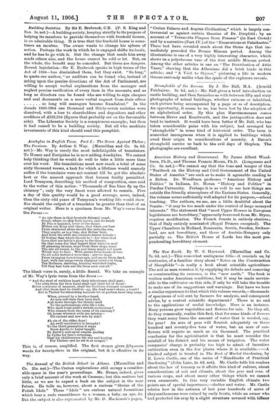Building Societies. By Sir E. Brabrook, C.B. (P. S. King
and Son. ls. net.)—A building society, keeping strictly to its purpose of helping its members to provide themselves with freehold houses, is an admirable thing. It is true that the freehold house is some- times an incubus. The owner wants to change his sphere of action. Perhaps the work in which he is engaged shifts its locale, and he has to go with it. But the change that sends him away sends others also, and the house cannot be sold or let. But, on the whole, the benefit may be conceded. But there are dangers. Recent legislation—Sir E. Brabrook speaks in high terms of the Act of 1894—has diminished them, but they exist. "So long," to quote our author, "as auditors can be found who, instead of acting upon the precise directions of the Act of Parliament, are willing to accept verbal explanations from the manager and neglect precise verification of every item in the accounts, and as long as directors can be found who are willing to sign cheques and seal documents on a mere verbal request from their officer
so long will managers become fraudulent." In the decade 1895-1901 one thousand and thirty-seven societies were dissolved, with a loss to shareholders and depositors and other creditors of .2522.234 (figures that probably err on the favourable side). The Liberator Society is a conspicuous example; but then it had ceased to be a building society. But all who meditate investments of this kind should reed this pamphlet.


































 Previous page
Previous page